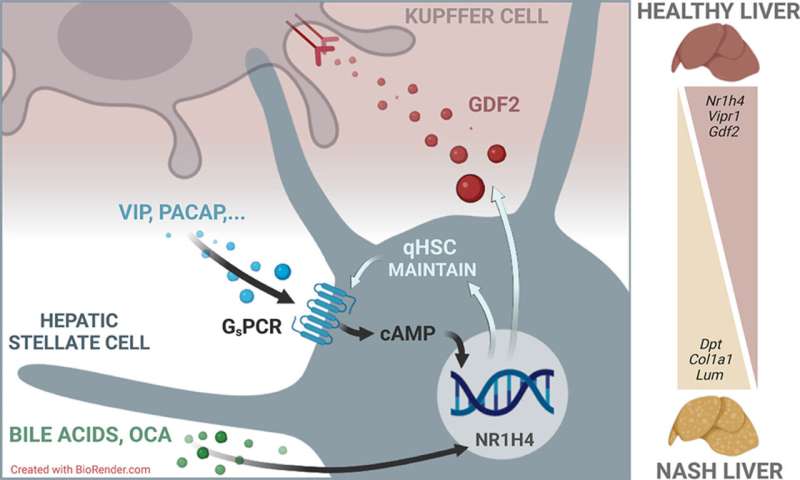This article has been reviewed according to Science X's editorial process and policies. Editors have highlighted the following attributes while ensuring the content's credibility:
fact-checked
trusted source
proofread
Hormones have the potential to treat liver fibrosis, new study finds

Hormone therapy may be associated with menopause and fertility treatment, but now an SDU-led research team reports that certain intestinal hormones seem to have a beneficial effect on the processes behind the formation of scar tissue in the liver (liver fibrosis).
Liver fibrosis may occur as a result of liver diseases such as metabolic dysfunction-associated steatotic liver disease (MASLD) and metabolic dysfunction-associated steatohepatitis (MASH), and currently, there is no medical treatment to cure liver fibrosis.
Doctors often try to address the underlying causes of the diseases, such as obesity and diabetes, and these treatments may lead to improved liver function over several years but they do not eliminate fibrosis.
The processes that initiate the formation of scar tissue in the liver, i.e., fibrosis, are cellular. In their new study published in the Journal of Hepatology, a Danish/American research team, led by Associate Professor Kim Ravnskjaer from the Department of Biochemistry and Molecular Biology and the ATLAS center of excellence, reports that they have found previously unknown changes in the cell types responsible for fibrosis formation.
These are the liver's so-called stellate cells, named for their star-like appearance.
"We have found a way to inactivate these cells and thus halt the fibrogenic process. This may offer a real opportunity for halting the formation of scar tissue," explains Kim Ravnskjaer.
One way to deactivate stellate cells is to expose them to certain intestinal hormones, the team discovered.
"We have focused mainly on the intestinal hormone called vasoactive intestinal polypeptide (VIP), which is naturally present in the intestine and neurons, from where it is released when we eat. The liver's stellate cells, in particular, have a high expression of specific VIP receptors on their surface. VIP stimulates the liver's blood supply but also appears to keep the stellate cells inactive," says Kim Ravnskjaer.
The researchers believe that their work could provide the basis for the treatment of liver fibrosis.
"This could result in new ways to treat patients. For example, one could develop synthetic hormones designed to target the receptors on specific cells," Ravnskjaer adds.
Research on liver fibrosis is ongoing worldwide, with many efforts focused on developing effective drugs. Unfortunately, these often come with serious side effects and for this reason, they are not approved.
"If we target these drugs more towards the cell changes we have discovered, we might be able to avoid many of the side effects," says Kim Ravnskjaer.
The results of the research team were initially seen in mice that for a year were fed what the scientist refers to as "a pretty bad western diet"; one high in fat and sugar.
"When we discovered these cell changes in diseased liver tissue from mice, we went on to look for them in diseased liver tissue from humans. We examined tissue from liver patients from two hospitals in Denmark, and we found the same cell changes in all tissue samples," Ravnskjaer says.
The researchers will now continue studying stellate cells and their surface receptors in patient samples.
"The more precisely we can target the right cells, the fewer side effects and the better for the patient," says Kim Ravnskjaer, emphasizing that a new drug based on these discoveries are still years away.
More information: Sofie M. Bendixen et al, Single cell-resolved study of advanced murine MASH reveals a homeostatic pericyte signaling module, Journal of Hepatology (2023). DOI: 10.1016/j.jhep.2023.11.001





















